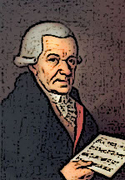Michael Haydn @ RISM
Martina Falletta
Monday, September 24, 2012

This September marks the 275th birthday of Johann Michael Haydn. To celebrate the occasion, the city of Salzburg is hosting a variety of concerts and events where one can hear works by Michael Haydn (14 September 1737, Rohrau, Austria – 10 August 1806, Salzburg). A new, compact biography will be published soon entitled Außerordentlich beliebt und bekannt … Johann Michael Haydn 1737-1806. Leben. Werk. Zeit by Sabine Kohn and Gerhard Walterskirchen (Stuttgart: Carus, 2012).
Among the composers with the most sources in the RISM online catalog, Michael Haydn holds 5th place. He is surpassed only by – apart from the collective term “Anonymous” – his brother Joseph, Georg Friedrich Händel, Giovanni Pierluigi da Palestrina and Wolfgang Amadeus Mozart. The catalog offers over 5,600 entries on Michael Haydn.
This younger Haydn brother used his official duties at the religious court in Salzburg (1763-1806), appropriately, to contribute to practically all of the genres used in the Catholic liturgy. This includes more than 30 masses in a wide variety of instrumentations, both of the requiems and settings of the Te Deum, liturgical pieces for smaller performing forces such as proprium movements, litanies, responsories for Advent, Holy Week, and Corpus Christi, and settings of the Tantum ergo, Salve Regina, and Regina coeli. Stylistically, Hadyn’s compositions build a bridge from the early classical period to the musical Biedermeier age and significantly molded musical life in Salzburg.
Instrumental works make up only about a sixth of Haydn’s oeuvre, with not quite 150 works (symphonies, concertos, serenades, and chamber music). The symphonies form the most important category in that group.
Many of Haydn’s main works are indexed in the online catalog. Among these are the Missa Sti. Aloysii (MH 257), Missa sub titulo Sti. Leopoldi (MH 837), the German mass Hier liegt vor deiner Majestät (MH 560), the ca. 130 settings of the gradual, and the Requiem in C minor (MH 155), which Haydn composed upon the death of his first employer in December 1771, Prince-Archbishop Count Sigismund von Schrattenbach. Numerous manuscripts are also extant of the works that Haydn created by order of the Viennese imperial family: the Theresien mass (MH 796), Missa sub titulo S. Francisci Seraphici (MH 826) with the gradual Cantate Domino canticum novum (MH 828), the offertory Domine Deus (MH 827), and Te Deum (MH 829).
Share Tweet EmailCatégorie: Anniversaires

